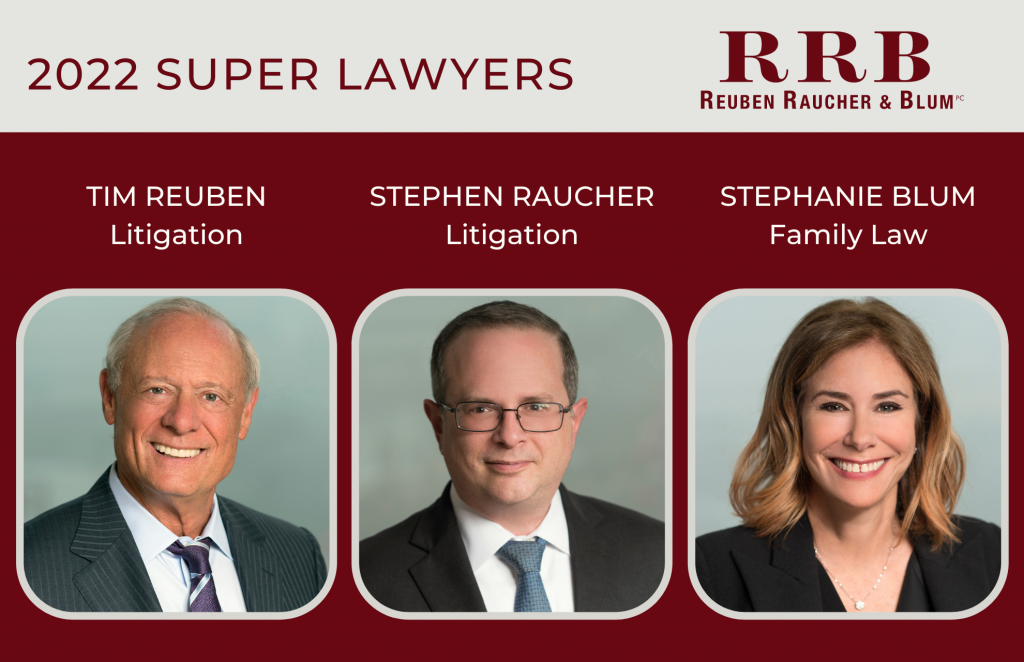Reuben Raucher & Blum attorneys Timothy D. Reuben, Stephen L. Raucher, and Stephanie I. Blum are named as Southern California “Super Lawyers” for the 2022 edition of Southern California Super Lawyers magazine. Read the press release here.

Reuben Raucher & Blum attorneys Timothy D. Reuben, Stephen L. Raucher, and Stephanie I. Blum are named as Southern California “Super Lawyers” for the 2022 edition of Southern California Super Lawyers magazine. Read the press release here.

Timothy Reuben, Stephen Raucher and Stephanie Blum have been recognized as nominees for the the Los Angeles Business Journal 2021 ‘Leaders in Law Awards.’
Living Brentwood magazine spotlights Stephanie Blum and Tim Reuben in their December 2021 edition.
Timothy D. Reuben’s article A Disappointing Opinion is published in the Los Angeles Daily Journal on October 6, 2021.
Timothy D. Reuben’s article COVID Vaccine Mandates and the Right to Swing Your Arms is published in the Los Angeles Daily Journal on September 14, 2021.
Timothy D. Reuben appears on the cover of the September 2021 issue of Los Angeles Lawyer magazine, in which his article “Dereliction of Duty” explains the outcome of a historic case.
Timothy D. Reuben and Stephanie I. Blum’s article Ruling Clarifies Precedent On Expert Reliance On Hearsay is published in the Los Angeles Daily Journal on August 23, 2021.
The Los Angeles Daily Journal profiles the firm in an article called “The Fixers“.

In Damaris Rosales v. Uber Technologies, Inc. (May 4, 2021) 2021 DJDAR 4243, the Court of Appeal, Second Appellate District, clarified that a plaintiff asserting a claim for civil penalties under the Labor Code Private Attorneys General Act of 2004 (“PAGA”; Lab. Code, § 2698 et seq.) cannot be compelled to arbitrate the threshold question of whether the plaintiff is an employee or an independent contractor for purposes of PAGA.
In Rosales, plaintiff Damaris Rosales (“Plaintiff”) alleged a single cause of action for wage violations under PAGA against defendant Uber Technologies, Inc. (“Uber”). Plaintiff was an Uber driver under a written agreement stating she was an independent contractor and all disputes between Plaintiff and Uber arising out of or related to the agreement, including disputes regarding wage and hour laws, would be resolved by arbitration under the Federal Arbitration Act (“FAA”). Uber brought a motion to compel arbitration, seeking an order compelling Plaintiff to delegate the issue of arbitrability to the arbitrator and to arbitrate the issue of whether Plaintiff was properly classified as an independent contractor under the parties’ arbitration agreement. The trial court denied Uber’s motion to compel arbitration, holding that “no part of the [parties’ arbitration agreement], including the delegation provision, binds the State of California, on whose behalf [plaintiff] brings the PAGA claim.” (Rosales, supra, 2021 DJDAR at p. 4243.)
The Court of Appeal affirmed the trial court’s order denying Uber’s motion to compel arbitration. Citing two recent Court of Appeal cases, the Rosales Court held that a PAGA plaintiff cannot be compelled to arbitrate whether he or she is an “aggrieved employee.” “[T]hreshold issues involving whether a plaintiff is an ‘aggrieved employee’ for purposes of a representative PAGA-only action cannot be split into individual arbitrable and representative nonarbitrable components.” (Provost v. YourMechanic, Inc. (2020) 55 Cal.App.5th 982, 996; see also Contreras v. Superior Court (2021) 61 Cal.App.5th 461, 472-472 [the preliminary question of whether the petitioners were “aggrieved employees” under PAGA “may not be decided in private party arbitration.”].) The Rosales Court also rejected Uber’s argument that, under the FAA, the parties’ agreement to delegate the issue of arbitrability to the arbitrator is enforceable.
It is a well-established rule in California that PAGA claims are not arbitrable because the state will not be a party to an employer and employee’s arbitration agreement. Rosales serves to clarify the broad scope of this rule by holding that a plaintiff cannot be compelled to arbitrate specifically the threshold question of whether the employee is an employee or independent contractor for purposes of PAGA.
Reuben Raucher & Blum Managing Principal Timothy D. Reuben is quoted in Southern California Record regarding a recent controversial decision by the Santa Monica City Council to award attorney’s fees to a watchdog group suing the City.
Timothy D. Reuben’s article Skid Row Ruling Should Be Required Reading is published in the Los Angeles Daily Journal on April 27, 2021.
Timothy D. Reuben’s article Court of Appeal Ruling Muddies the Waters on Punitive Damages is published in the Los Angeles Daily Journal on March 1, 2021.
Timothy D. Reuben’s article Ballot Designations Favor Prosecutors for the Bench is published in the Los Angeles Daily Journal on March 12, 2020.
Timothy D. Reuben’s article Courts Shouldn’t Punish Those Who Can’t Afford to Pay Fines is published in the Los Angeles Daily Journal on February 18, 2020.